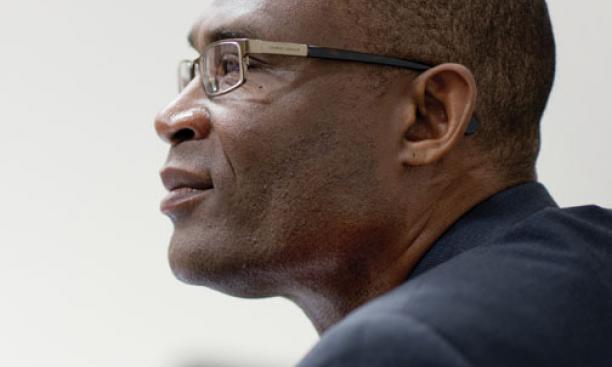

The Center for African American Studies (CAAS) regularly hears from students asking the same questions: When will Princeton offer an undergraduate major in African-American studies? When will it have a graduate program?
“People are saying it’s time to raise it to the next level,” said Professor Wallace Best, the center’s acting chairman.
Since the center was established in 2006, it has increased the number of certificate students, added programs for graduate students, and boosted the number of courses offered. But with the recent departures of several high-profile faculty members — Cornel West *80 among them — and no set time frame for the introduction of a major, the center is evaluating how much it has achieved and how far it still has to go.
This fall the center began an external review by a committee of academics from other institutions. “It’s a wonderful opportunity to assess where our strengths and weaknesses are, and to address them,” said Professor Eddie Glaude *97, who serves as the center’s chairman but is on leave this year.
The center is coping with the absence of West, one of Princeton’s most prominent faculty members, who left last year to teach at Union Theological Seminary in New York. Other departures include associate professor Melissa Harris-Perry, host of her own show on MSNBC, who left in 2011 for Tulane; and Noliwe Rooks, the center’s associate director, who went to Cornell. Valerie Smith cut back her teaching time after becoming Princeton’s dean of the college in July 2011.
“Cornel’s departure will certainly impact us — he’s one of the foundations of African-American studies at Princeton — but our vitals are good,” Glaude said.
The center currently has 14 faculty members, 13 of whom have joint appointments with another department. Several faculty searches are on hold until the external review’s conclusion. Filling the openings left by West and others, Best said, is “about attracting young scholars who have shown enormous promise, rather than focusing on well-known figures in the field.”
President Tilghman praised the center for attracting “an outstanding group of young faculty” who teach in many departments. This approach, she said, has helped advance her goal of having students “thinking about race in America throughout their (Princeton) education, and not just in one or two courses. Have we achieved the goal? I think this is a work in progress, and it will take some time, but we certainly have the right approach.”
Enrollment in the center’s courses, many crosslisted with other departments, increased nearly 50 percent — from 491 in the 2006–07 academic year to 729 in 2010–11 — before dipping to 632 last year. The center’s introductory course went from 159 students in 2010 (when it was taught by West) to 39 in 2011.
Popular classes include “Race and the American Legal Process” and “Black Power and its Theology of Liberation.” There also are classes on migration and the literary imagination, black music culture, and the black melting pot.
The center’s certificate program has 37 undergraduates, up from 28 in 2006. Rachel Neil ’13 said the center offers “the kind of classes where I’m still talking to my classmates about the discussion we had in class after we leave.” Neil said she might have majored in African-American studies if it were offered.
Princeton is the only Ivy League institution that does not offer a major in the field, and it is the only Ivy except Dartmouth without a graduate program.
“We are an outlier,” Glaude said. “We should be involved in training the next generation in the field.” He hopes a major will be offered in the 2015–16 academic year. Tilghman said she preferred not to comment on the issue of a major before seeing the results of the external review.
The center has added a certificate program for graduate students and a faculty-graduate seminar. “My time in CAAS in many ways actually served as the womb of my dissertation topic,” said Clifton Granby, a doctoral student in religion. “The idea, the inspiration, had everything to do with the exposure to new thinkers and fresh ideas that CAAS afforded me.”
Students such as Granby spur Glaude to push for more.“We’ve done a lot of work to plant African-American studies in the soil of Princeton,” Glaude said. “Now we’ve got to keep watering.”
